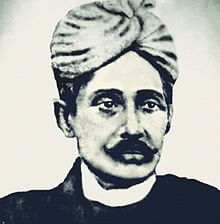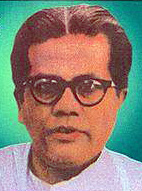Introduction
Maniram Dutta Barua, widely known as Maniram Dewan, was a prominent figure in Assam’s history. Born on April 17, 1806, he was not just the first Indian to establish tea gardens in Assam but also a freedom fighter who stood against British rule. His contributions to Assam’s tea industry and his role in the 1857 revolt make him a key historical personality.
Early Life and Background
Maniram Dewan was born during a turbulent period in Assam’s history. The state had witnessed the Moamaria Rebellion and the devastating Burmese invasions (1817-1826), which weakened the Ahom kingdom. His ancestors, originally from Kannauj, migrated to Assam in the 16th century and held high-ranking positions in the Ahom court. However, due to the Burmese invasions, his family sought refuge in Bengal under British control. They later returned to Assam after the Treaty of Yandabo (1826), which ended the First Anglo-Burmese War and placed Assam under British rule.
Treaty of Yandabo and British Takeover
During the Burmese invasion, Assam fell under Burmese control, but the British East India Company defeated them and took control through the Treaty of Yandabo in 1826. This treaty marked the beginning of British rule in Assam, which significantly shaped Maniram Dewan’s journey.

Early Career and Association with the British
Maniram initially worked with the British administration. He became a close associate of David Scott, the British Governor General’s agent in Northeast India. At the age of 22 (in 1828), he was appointed as the Tehsildar and Sheristadar of Rangpur under Captain John Bryan Neufville. Later, he served as the Prime Minister (Borbhandar) under Purandar Singha, the titular Ahom king.
However, when the British deposed Purandar Singha in 1838, Maniram resigned from his government post. This was a turning point, as he gradually turned against the British rule.
Maniram Dewan and the Tea Industry
One of Maniram’s biggest contributions was introducing Assam tea to the world. The British were unaware of the Singpho people’s tea cultivation, but Maniram informed them about the wild tea plants grown in Assam. He guided Robert Bruce and Charles Alexander Bruce to Singpho chief Bessa Gam, who helped them collect tea samples. This discovery led to the establishment of Assam’s tea industry.
First Indian Tea Planter
In 1839, Maniram was appointed as the Dewan of the Assam Tea Company at Nazira, earning Rs. 200 per month. However, due to differences with British officials, he resigned in the 1840s and started his own tea gardens at Chinamara (Jorhat) and Selung (Sibsagar), making him the first Indian to commercially grow tea.
Other Business Ventures
Maniram was a visionary entrepreneur who wanted Assam to become self-reliant. Apart from tea, he engaged in:
- Gold procurement
- Salt production
- Iron smelting
- Brick making
- Boat building
- Ivory work
- Agriculture
He was highly respected in Assam, and even neighboring state chiefs considered him a demi-God.
Struggle Against the British
By the 1850s, Maniram had developed a strong opposition towards British rule. The British made it difficult for Indians to establish private tea plantations, favoring European planters. In 1851, his facilities were seized, pushing him and his 185-member family into economic hardship.
Role in the 1857 Revolt
When the Indian Revolt of 1857 began on May 10, 1857, Maniram saw it as an opportunity to restore Ahom rule. He sent secret messages to Kandarpeswar Singha (Purandar Singha’s grandson) through disguised fakirs. He urged Kandarpeswar to rebel against the British with the help of Indian sepoys from Dibrugarh and Golaghat.
Maniram’s plan was supported by several Assamese leaders, including:
- Peali Baruah
- Urbidhar Barua
- Mayaram Barbora
- Kamala Charingia Barua
- Mahidhar Sarma Muktear
- Sheikh Bhikun and Nur Mahammad (Subedars)
They planned to install Kandarpeswar as king on Durga Puja, capturing Jorhat, Sibsagar, and Dibrugarh. However, before the plan could be executed, the British uncovered the plot and arrested the leaders.
Arrest and Execution
Maniram was arrested in Calcutta, detained in Alipur Jail, and later brought to Jorhat. His secret letters were intercepted by Captain Charles Holroyd, who identified him as the mastermind behind the rebellion. Based on the statements of Haranath Parbatia Baruah (Daroga of Sibsagar), Maniram was sentenced to death.
Hanging of Maniram Dewan
On February 26, 1858, Maniram Dewan and Peali Baruah were publicly hanged at Jorhat Jail at the age of 51. His death was mourned across Assam, and tea workers went on strike in his support. However, the British crushed the uprising with brutal force.
Legacy of Maniram Dewan
Maniram Dewan Trade Centre
In 2009, the Maniram Dewan Trade Centre was inaugurated in Betkuchi, Assam. Spanning 10 acres, it serves as a major center for trade and industry promotion in Northeast India. This tribute honors Maniram’s contributions to Assam’s economic development.
Maniram Dewan Movie
In 1963, the Assamese film ‘Maniram Dewan’ was released, depicting his life and contributions. The film featured the iconic song ‘Buku Hum Hum Kare’ sung by Dr. Bhupen Hazarika. The movie won the President’s Silver Award and remains a significant part of Assamese cinema.
Conclusion
Maniram Dewan’s contributions to Assam’s tea industry, entrepreneurship, and the freedom movement make him a remarkable historical figure. His sacrifice in the 1857 revolt and his vision for Assam’s self-reliance continue to inspire generations. His name is etched in history as a pioneer, a leader, and a freedom fighter who dared to challenge British rule and dream of a prosperous Assam.
FAQ’s:
Q 1. Who was Maniram Dewan?
Maniram Dewan was an Assamese nobleman and entrepreneur known for being one of the first Indians to grow tea commercially in Assam. He was also a freedom fighter who fought against British rule.
Q 2. When and where was Maniram Dewan born?
Maniram Dewan was born on April 17, 1806, in Assam, India.
Q 3. Why is Maniram Dewan important in Assam’s history?
He played a key role in Assam’s tea industry and fought for India’s freedom from British rule. He helped establish tea gardens and tried to make Assam self-reliant.
Q 4. What was Maniram Dewan’s role in the tea industry?
He informed the British about Assam’s naturally growing tea and later started his own tea gardens at Chinamara (Jorhat) and Singlou (Sibsagar), making him the first Indian to grow tea commercially.
Q 5. How did Maniram Dewan fight against British rule?
During the 1857 Revolt, Maniram Dewan planned to restore the Ahom rule in Assam by collaborating with local leaders and Indian sepoys. However, the British found out about the plan and arrested him.
Q 6. How did Maniram Dewan die?
Maniram Dewan was hanged by the British on February 26, 1858, in Jorhat Jail after being accused of leading a rebellion.
Q 7. What was the Treaty of Yandabo?
The Treaty of Yandabo (1826) was signed between the British and Burmese rulers, ending the First Anglo-Burmese War. Through this treaty, the British took control of Assam.
Q 8. What other businesses did Maniram Dewan start?
Apart from tea cultivation, he was involved in gold mining, salt production, iron smelting, ivory work, brick making, boat making, and agriculture.
Q 9. What is the Maniram Dewan Trade Centre?
It is a business and trade expo center in Guwahati, inaugurated in 2009, named in his honor to promote trade and industry in Assam.
Q 10. Is there a movie about Maniram Dewan?
Yes, a movie named “Maniram Dewan” was released in 1963. The film won the President’s Silver Award and featured the famous song “Buku Hum Hum Kare” by Dr. Bhupen Hazarika.












